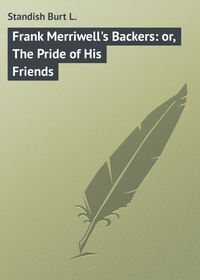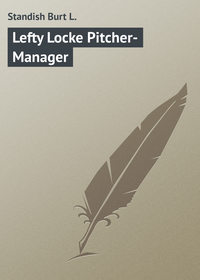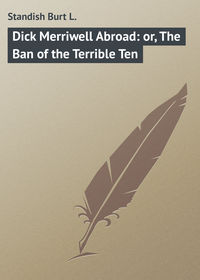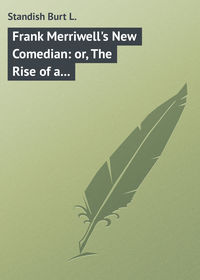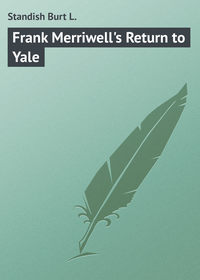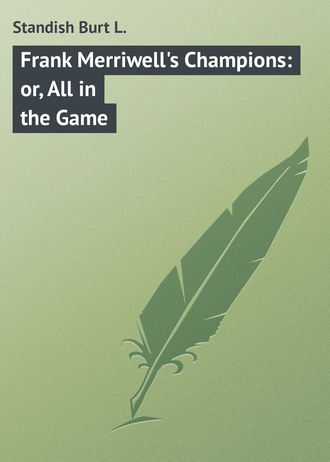 полная версия
полная версияFrank Merriwell's Champions: or, All in the Game
“Hold fast!” he again called to the girl.
Then the horse was turned from the road, was swept about in a complete circle, and by the time it again faced in the direction it had been running, it was brought to a stop.
“Jump down quickly,” directed Frank, as he saw the pursuing man come thundering nearer and nearer. “This horse will act bad when he comes up.”
The girl obeyed. Down from the saddle she slipped to the ground, losing no time in getting away from the prancing horse.
Up came the man, flushed of face and shaking with excitement. He gave a yank at the bit that fairly flung the black gelding upon its haunches, and he hoarsely cried:
“That confounded beast ought to be shot through the head!”
At the sound of the man’s voice the horse Frank was holding showed every symptom of fear, making a sudden attempt to break away.
Merriwell spoke soothingly to the creature, holding fast to the bit with a firm, steady hand, and patting its neck.
“It’s not the horse,” was his thought, “it’s the man who ought to be shot!”
“You are not harmed, are you, Iva?” somewhat anxiously asked the man, addressing the girl.
“No,” she answered, her voice showing the least trace of agitation; “thanks to the brave action of this young stranger, I am not.”
At this the horseman scowled fiercely on Frank.
“Thanks to nothing!” he muttered. “I should have overtaken and stopped the skittish brute. If it hadn’t been for these smart youngsters on their confounded bicycles, the horses would not have been frightened.”
“I think you are mistaken about that, sir,” said Frank, promptly. “When we came in sight of you both horses were frightened, and you were abusing your own mount. I think you are entirely responsible for this runaway, and, if I were this young lady, I should be cautious about riding out with you again.”
“Insolent puppy,” grated the man. “How dare you talk to me like this! Why, I – I’ve a mind to – ”
“I wouldn’t try it, sir!” came sharply from Merriwell, as the fellow lifted his whip. “You touched me with that back in the woods, and I do not care to have you repeat it.”
There was something in Frank’s manner that caused the man to lower the whip, boy in years though it was who faced him so boldly.
The girl stepped forward quickly.
“Stop, Cousin Stephen!” she cried. “This brave young man stopped Rex, and it may be that he saved my life. You should thank him instead of quarreling with him.”
“Thank him for nothing!” growled the man. “It’s a wonder he didn’t pitch you out of the saddle and kill you when he caught the horse by the bit and yanked its head around.”
Barney came riding up, and both horses pricked up their ears and regarded the bicycle with signs of mingled doubt and alarm.
“Get off – get off from that, you fool!” cried the man. “What do you want to do – scare the blooming beasts into running away again? Don’t you know anything?”
That was enough to start Barney’s temper.
“Av ye’ll shtep down a minute, Oi’ll be afther showin’ yez a few things Oi know,” he flung back.
Other horsemen were seen approaching swiftly. There were three in the party, and they headed straight toward the little group in the road.
“Why, it is father and Kenneth!” exclaimed the girl, as she observed them. “And the other is – is Mr. Harden!”
Something like a curse came from beneath the black mustache of the man she had called “cousin.” He glared at the approaching horsemen, and Frank heard him mutter:
“What in Satan’s name is Harden doing here? I believe he saw the runaway! Hang the fellow! he’s always around!”
Up came the horsemen, with a clatter of hoofs. The youngest of the party was not older than Frank, and he was a fine-looking youth, with dark eyes and curling hair. Next to him was a young man of twenty-two or three, with a blond mustache, and the third was a man of fifty, with an iron-gray beard.
The youngest of the strangers leaped from the saddle, and was at the girl’s side in a moment, exclaiming:
“Are you all right, sister mine? You are not harmed?”
“Not a bit!” she half laughed; “but there is no telling what might have happened but for the brave young man there who stopped Rex. The horse had the bit in his teeth, and I could do nothing with him.”
“We saw it – saw it all,” declared the youth. “We reached the top of the hill yonder in time to witness his act, and I must say it was as nervy and skillful as anything I ever beheld. Sir” – speaking to Frank – “I wish to thank you for your gallant rescue of my sister.”
He held out his hand, and Frank accepted it. Each felt a thrill as they crossed palms, and their eyes met, and it seemed that a bond of friendship was cemented between them.
“My name is Kenneth St. Ives,” explained the strange lad.
“And mine is Frank Merriwell,” said our hero.
“Mr. Merriwell, I am happy to know you,” declared Kenneth. “Permit me to properly present my sister.”
Smiling, Frank lifted his cap and bowed gracefully, but the girl held out her hand, her full lips parting to show her fine white teeth, as she smilingly said:
“Let me shake hands, also, Mr. Merriwell. Pardon the glove.”
On his horse, “Cousin Stephen” glared and ground his teeth.
CHAPTER XX – AT SPRINGBROOK FARM
Then Kenneth St. Ives introduced his father and Mr. Harry Harden. To avoid an introduction, Stephen Fenton had turned his horse about, and was staring sullenly in the opposite direction.
“Mr. Merriwell,” said Preston St. Ives, dismounting to take Frank’s hand, “I owe you much for your daring service to my daughter. I shall always feel that I am indebted to you.”
Harden dismounted, and talked with Iva, while Fenton glared at them in a side-long manner, chewing the ends of his black mustache and scowling fiercely.
Within a very few moments Preston St. Ives found out that Frank and Barney were on their way to New York, and that they were closely followed by a party of friends.
“New York is a long distance away,” smiled the father of the girl Frank had rescued. “At most, you would not think of proceeding farther than Philadelphia to-night.”
“We intended to stop there,” said Frank.
“But there is no reason why you should be in a great hurry,” said St. Ives, “and so you must stop at Springbrook Farm to-night.”
“Springbrook Farm?”
“That is our country place,” Kenneth hastily explained. “It is a roomy, old-fashioned place, and there will be plenty of room for you all. You can’t refuse, Mr. Merriwell!”
At first Frank attempted to decline the invitation, but Iva added her invitation to that of her father and brother, and Kenneth promised a jolly time, so that Merry was really inclined to go. A look at Barney’s face showed he was eager to have Frank accept the invitation.
“Well, Barney,” said Frank, “if we stop at Springbrook Farm to-night, you’ll have to watch out for the fellows and let them know about it.”
“Thot Oi’ll do, Frankie,” immediately agreed the Irish lad. “But pwhere is Springbrook Farrum!”
“The farm may be seen from the top of the hill yonder,” said Kenneth. “Come along with us, and we will point it out to you.”
At this juncture, Stephen Fenton suddenly yanked the head of his horse about, gave the creature a cut with the whip, and went tearing along the road in a cloud of dust, having left the others without a word.
“What is the matter with him?” cried Preston St. Ives, watching the fellow with a look of displeasure. “It’s a wonder that horse doesn’t run away with him and kill him!”
“Oh, he has been in a cross mood all the afternoon, papa,” said Iva. “He is out of sorts with everything and everybody, and it was because he accidently struck Rex with his whip that the dear old fellow ran away with me.”
She caressed the muzzle of the horse as she spoke, and the creature seemed pleased with such attention.
“It would serve him right if Firefoot should run away with him!” exclaimed Kenneth, also watching the retreating form of Fenton. “He is hard on a horse, and it’s a wonder to me that he hasn’t been killed before this. He seems to stick in the saddle some way, although he is anything but an easy rider.”
“If that horse’s mouth is not already spoiled, he will spoil it in a week,” declared Frank.
Mr. St. Ives gave Merry a quick look, as if wondering what he knew about horses.
“I think you are right, young man,” he said. “I didn’t want to let him have Firefoot, but he seemed to take a fancy to the creature, and not another horse out of the stableful would satisfy him. He’ll not get the animal again.”
Then there was a mounting of horses, while Frank went back along the road to look for his wheel He found the bicycle all right as it lay beside the road, Barney having stopped to get it out of the highway.
The Irish lad accompanied Frank, and he was enthusiastic over the prospect of sport at Springbrook Farm.
“It’s no tellin’ pwhat we’ll stroike there, me b’y!” he chuckled. “It’s the last chance for a bit av fun before we get inther New York.”
“I didn’t intend to stop again for anything, for we spent far too much time at Blue Cove. Virginia was not easy to break away from.”
“Roight ye are, Frankie. It’s a great Shtate Vir-ginny do be. An’ the b’ys down there are all roight.”
“As fine a set of fellows as I have met anywhere in the whole country,” declared Merry, with a touch of enthusiasm. “They are chivalrous, hospitable and sporty. Jack Diamond is a representative Virginian. He is all right.”
“Yis, he seems to be since he got back inther this parrut av th’ country, but it’s a growler Oi thought he wur at firrust.”
“He did not seem like himself while we were in the West,” confessed Frank. “I was surprised at the change in him, but I knew it was not natural, and I bore with him.”
The others came up, Frank mounted his wheel, and they all rode along together, chatting pleasantly. Frank was questioned, and he told of his trip across the continent and back, arousing Kenneth St. Ives’ interest.
“Well, you must have had sport!” Kenneth exclaimed. “I should have enjoyed that. Say, father, we must get up something in the way of sport while they are at Springbrook. Can’t we have a hunt?”
“It’s too early in the season, my son,” smiled Mr. St. Ives.
“I don’t know about that,” declared Kenneth. “We’re liable to have a frost any morning now. It is chilly at times for this season. Perhaps to-morrow morning – ”
“The Meadowfair Club visits us to-morrow, you know.”
“I had forgotten that. So much the better! If Mr. Merriwell and his friends will stay, we’ll find some sort of sport to amuse them.”
The top of the hill was reached, and then Springbrook Farm was pointed out, lying on a hillside two miles distant. It was a beautiful place. The great stables seemed modern, but the house was an immense colonial mansion, surrounded by tall trees. The farming land was a broad prospect of cleared land, upon which were great meadows and small groves. Cattle and horses were to be seen, and it had the appearance of a stock or dairy farm.
“There is the place, Mr. Merriwell!” cried Kenneth St. Ives; “and a more beautiful spot is not to be found in all Pennsylvania.”
Frank did not wonder at Kenneth’s enthusiasm.
Not far from the old mansion was a small lake, with a boathouse on the shore, and some boats lying near.
Frank felt sure that the rest of the party could not be far behind, so Barney would not be compelled to wait long; but it was necessary that some one should meet them, as Springbrook Farm lay off from the main highway, being reached by means of a private drive, and the bicyclists, unless notified, would not know Frank contemplated stopping there.
Barney was willing to wait for them, and so the others rode onward, Frank wheeling along and chatting with them all.
Stephen Fenton was seen riding up the last incline toward the distant mansion, still forcing his horse.
When the place was reached a hostler was at work over Firefoot in one of the stables, and the animal showed the abuse it had received.
Mr. St. Ives dismounted and looked Firefoot over, observing:
“That’s fine shape for a horse to be in after a canter along the road. The creature could not look worse if it had been following the hounds across country. I think Stephen will have to take another horse the next time he goes out.”
“Beggin’ yer pardon, sir,” said the hostler, with gruff respect; “but he says as how he were not to blame. You knows, sir, as how this beast is onruly, sir, an’ Mr. Fenton says it were skeered by some saucy chaps on bisuckles that paid no attention to its snortin’ an’ rearin’. You know yerself, sir, as how most of the bisuckle riders are sassy villains, sir.”
This was said regardless of the fact that Frank had trundled his wheel into the stable, and the hostler could not help knowing a cyclist was hearing every word he spoke.
Preston St. Ives did not deign to make any reply to the hostler’s words, but said:
“See that Firefoot is well rubbed down and cared for, Wade. You need not let Stephen have him again. Remember.”
“All right, sir – all right,” muttered the hostler, glancing at Frank in a side-long manner. “You knows your business, sir, an’ I’m here to take your orders, sir.”
The hostler had several assistants, and they were on hand to care for the animals just brought in.
Kenneth showed Frank where to leave his wheel, and then Merry followed the youth into the house.
CHAPTER XXI – TWO ENCOUNTERS
“Vale,” grunted Hans, as he stretched himself on the ground in the shade of some shrubbery, “uf dese don’t peat der pand, you vos a liar!”
“Wal, I’m swuzzled ef it ain’t pretty gol darn slick,” agreed Ephraim, thrusting his hands into his pockets and looking around admiringly. “It’s queer haow Frank falls inter sech snaps as these. Heer we be invited to stay right heer at this place an’ make aourselves to hum jest as long as we want to.”
“And I feel as if I could remain here forever,” grunted Bruce, from a comfortable hammock, of which he had taken immediate possession on seeing it. “There’s something soothing and restful about this place that agrees with my nerves and promises balm and healing for my constitution that has been shattered by Arkansaw chills. It’s simply great!”
“It is rather jolly,” said the voice of Harry from the cool shadows of a vine-covered arbor.
“But it’s tame it’d be afther a bit, me b’ys,” declared Barney Mulloy, who was leaning against the trunk of a tree. “It’s sbort we’re lookin’ afther, an’ it’s ded quoiet here.”
“Mr. Kenneth St. Ives promises us some sport if we care to remain,” put in Bart Hodge, quietly.
“Phwat sort av sbort do yez think they can scare up here?” asked Barney, with a trace of contempt in his voice. “It’s croquet we moight play, but thot’s altogither too excoiting.”
“Yaw,” grunted Hans; “dot growkay likes me, for id don’d peen so much drouble to blay him. Der balls can knock me apoud shust so easy as nefer vas.”
“Frank and Jack seem to be enjoying some mild sport,” said Harry, as the click of billiard balls and Merriwell’s infectious laugh came from the open windows of a large summerhouse in the shrubbery close at hand.
“Those fellows never seem to care about resting,” grunted Browning. “They will wear themselves out long before they are old men, unless they let up in their wild career.”
All of the boys had reached Springbrook Farm, and Toots was taking care of their wheels. They had been left to themselves for a time, while Preston St. Ives and Kenneth went away to see that proper arrangements were made for the entertainment of their guests.
It had not taken Frank and Jack long to find the billiard table and get into a game, pulling off their jackets to it, as if they were in deadly earnest.
As the boys lolled there in the shade, they saw Harry Harden and Iva St. Ives come down a walk and pass near them, chatting and laughing, seeming well satisfied with each other’s society.
At a distance behind them, taking care not to be seen, Stephen Fenton stole along, keeping jealous watch of them.
“Aisy, b’ys,” warned Barney, speaking softly. “Take a look at th’ spalpane through th’ bresh here. It’s a dirruty face he has, or me name’s not Mulloy.”
“That’s what he has,” nodded Hodge, who took an instant dislike to Fenton. “Who is he? Is that the fellow who was with Miss St. Ives?”
“Th’ same, bad cess to him! She was afther callin’ him ‘cousin’.”
“He is following them!” exclaimed Harry, softly. “You don’t suppose he will try any crooked work, do you?”
“Oi have a fancy Misther Harden can look out for hisself, me lads,” said Barney. “Oi’ll back him against Mr. Fenton.”
“Yaw,” said Hans. “When Parney says dot, id peen all right. He knows my pusiness.” Then the Dutch boy relapsed into a position of comfort again, while the jealous spy passed on, watching the couple ahead of him.
Five minutes later the boys were startled by the sound of excited voices and a feminine cry of alarm.
Barney seemed to be waiting for that sound, for he sprang away like a flash, and Bart Hodge was not far behind him. Through the shrubbery crashed the two, and, in a moment, reached a spot where they were able to see what was taking place.
One young man was rising from the ground, while another stood over him, with clinched fists, evidently having knocked him down. To the arm of the latter, begging him not to strike again, clung Iva St. Ives.
“Oi knew it!” chuckled Barney in delight. “It’s Fenton thot interfared, an’ th’ other b’y knocked him down.”
In truth, Fenton it was who was getting up from the ground, while it was plain that he had been struck by Harden.
“Oh, I’ll even this!” snarled the man who had received the blow.
“Come on!” cried Harden, whose blood was aroused.
“Stop, Cousin Stephen – stop, Mr. Harden!” cried the girl, in distress. “You shall not fight!”
“He insulted me!” flamed Harden.
“I called you a sneaking cur, as you are!” hissed Fenton, getting upon his feet.
“And I knocked you down, as you deserved!” flung back the other young man.
“Hurro!” came softly from the lips of the Irish lad. “Thot’s th’ shtuff! Sail in, Misther Fenton, an’ do up th’ spalpane!”
At this moment the other boys, with the exception of Browning, came crashing through the hedge, and were by the two young men.
Fenton looked up, muttered an imprecation and then sibilated at Harden:
“We will settle this some other time!”
“At any time you like,” was the prompt retort.
Then Fenton whirled and quickly vanished in the shrubbery.
“It’s all over,” said Hodge. “Let’s get out of this instanter, for it must be a trifle embarrassing to Miss St. Ives.”
This little encounter had revealed to the boys that Fenton was jealous of Harden, who, plainly enough, was paying attentions to Iva.
“I believe Fenton is a bad man to have for an enemy,” said Rattleton, with unusual seriousness, as the boys once more gathered about the hammock, which Browning had not left for all of anything that was taking place beyond the shrubbery.
“Well,” said Hodge, slowly, “it’s not likely he is in love with Frank, for Merry was not willing to be imposed upon by him. Frank may have to look out for the fellow.”
“What’s that you are telling about me?” called the pleasant voice of Frank himself, as he emerged from beneath the vines over the door of the summerhouse followed by Diamond. “I’m all the time looking out for somebody. Here I’ve been having the battle of my life with Jack, and only beat him one point. I won the game on a fluke, at that.”
“But he won it, as he always wins everything he goes into,” said the Virginian, with traces of mingled vexation and admiration.
Toots came panting toward the spot all out of breath.
“Lordy! Lordy!” he gasped; “I done ’clare teh goodness; I’s ’feared to stay ’roun’ dat stable any mo’!”
“What’s the matter?” asked Frank. “You haven’t cleaned up all those wheels as soon as this?”
“No, sar; but dat hostler in dar am crazy ma-ad, sar.”
“What’s the matter with him?”
“He done suffin’ to dat hawse Fiahfoot, an’ de hawse don kick him up again’ de side ob de stall. Wondah it didn’t kill him, sar! Po-erful wondah it didn’t bre’k some ob his bones! Made him so mad he got a fork an’ was gwan teh stick it right inteh dat hawse. I couldn’t stan’ teh see dat, an’ I hollered. Den he see I was a-watchin’ ob him, an’ he was ma-ad enough teh kill meh, sar. I don’ dar’ stay an’ clean dem bisuckles, Marser Frank.”
“Those wheels must be cleaned to-night,” said Merriwell, decisively. “Come with me, Toots, and I will settle this thing so the hostler will not interfere with you.”
He strode away toward the stable, and the colored boy followed at his heels. Hodge and Rattleton followed more leisurely.
As Frank entered suddenly he detected the hostler, wrench in hand, doing something to one of the bicycles. It looked as if the man was making an attempt to ruin the wheel.
And it happened that the wheel belonged to Frank!
Three bounds took Merriwell to the side of the man, whom he grasped by the collar, crying:
“What are you doing there?”
The man straightened up, and turned his bloodshot eyes on the youth. His face was flushed, and the odor of his breath told he had been drinking heavily.
“Leggo!” he snarled; “leggo, or I’ll smash ye!”
“What were you doing to that wheel?” demanded Frank.
“None o’ yer business!” roared the hostler. Then he dropped the wrench, and made a swinging blow at the boy.
Frank dodged the blow and thrust out his foot in a manner that sent the awkward man sprawling.
“Land ob wartermillions!” squawked Toots, delighted.
As the hostler scrambled up, his fingers encountered the handle of the wrench and closed around it. His face was purple with anger, and there was a furious glare in his bloodshot eyes. The thick lips, purple and swollen, curled back from his tobacco-stained teeth, and with a snarl that might have issued from the throat of some wild beast, he flung the wrench at Frank’s head.
“Look out dar!”
Toots uttered the cry, but Merriwell was watching the man closely, and he dodged the missile, which went whizzing past with an unpleasant sound.
A man was just stepping in at the door, and the wrench struck him on the breast, knocking him down as if he had been shot.
Then Rattleton and Hodge came running up, and bent over the fallen man, who lay groaning on the ground.
It was Stephen Fenton!
The hostler seemed suddenly sobered by his act.
“Gosh!” he muttered. “It were Steve I hit! Hope I didn’t kill him!”
Frank was keeping watch of Wade, but saw the man was appalled by the result of his angry act, and so ventured to turn about and hasten to Fenton’s side.
“Bring some water!” he ordered. “He may be seriously injured!”
Fenton’s face was purple, and he was gasping for breath, but, as Merriwell stooped to lift his head, he feebly but savagely motioned him back.
“Hands off!” gasped the man. “Keep away from me!”
Toots came running up with some water.
“Heah, boss!” he cried; “heah’s yo’ watah!”
“What do I want of water! Anybody – got some – whiskey?”
“Here!” cried Wade, quickly stepping forward, and taking a bottle from a pocket inside his red flannel shirt; “here’s a bit.”
It was a pint bottle, nearly a third full. Fenton grasped it with a shaking hand as he sat up, lifted it to his lips, and did not take it down till he had swallowed the last drop.
With a growl, he got upon his feet, flinging the empty bottle aside. He gave Frank a fierce look, then addressed Wade:
“What’s the matter with you, Bill? Did you want to kill me?”
“I didn’t throw it at ye, Steve – I mean Mr. Fenton. I didn’t mean ter hit ye.”
Fenton rubbed his chest and coughed.
“Lucky you didn’t kill me,” he said, huskily.
Kenneth St. Ives appeared.
“What’s the matter here?” he asked.
The hostler hastened to explain that he was simply moving the bicycles out of the way when Frank Merriwell assaulted him.
“It was my wheel,” said Frank, making a hasty examination, “and he has loosened things up generally around it. If I were to attempt to ride it now without putting it in shape, the chances are that I would break my neck the first hill I came to. It is plain enough that this wheel has been doctored to give me a fall.”




